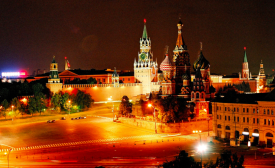russia
The Ministry of Culture, Government of India & National Gallery of Modern Art celebrate Indo-Russian Cultural Relations by mounting a special exhibition titled “Nicholas Roerich: An Eternal Quest” at Jaipur House, National Gallery of Modern Art, New Delhi, that will be on view till April 11, 2010.
In Russian political circles, Barack Obama's election tended to evoke two different reactions. Many officials were curious to see what new deals he would offer, but others, in the tradition of the Cold War, dismissed him as just the latest mouthpiece of the old American élites.
Broadly speaking, New Delhi and Moscow have both tended to calibrate the bilateral thermostat with an eye on the temperature in Washington. When the U.S. tries to cosy up to either power, India and Russia are quite happy to take for granted, if not forget, each other.
A collection of artifacts from Moscow’s Kremlin Palace has gone on view at İstanbul’s Topkapı Palace Museum, offering a glimpse into the fascinating lifestyles led by Russian czars during the 16th and 17th centuries.
Russian Prime Minister Vladimir Putin visits New Delhi this week hoping to seal military cooperation deals worth around $4 billion (2.9bn euros). But experts says there will be more than just contracts up for grabs.

This research examined the use of public diplomacy strategies by the Russian federation and the West in order to extend or maintain a soft-power presence in what has become known as the "Russian near abroad" or Russia’s sphere of "privileged interest."
There’s nothing quite as satisfying as a good patriotic cry. Russians and like-minded Ukrainians are lining up these days to see a movie, “Taras Bulba”, that allows them this public pleasure while undercutting Ukraine’s separate national identity. A real “twofer” for the movie’s sponsors, the Russian government.







